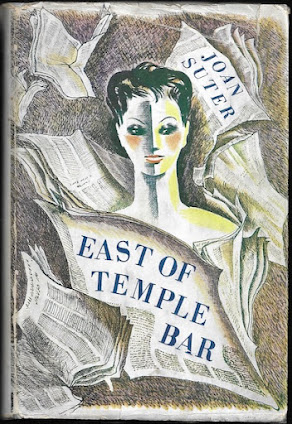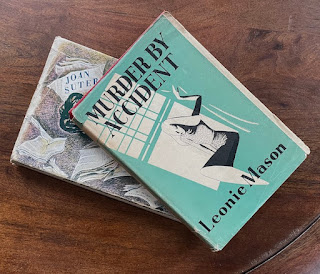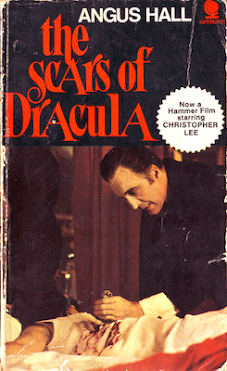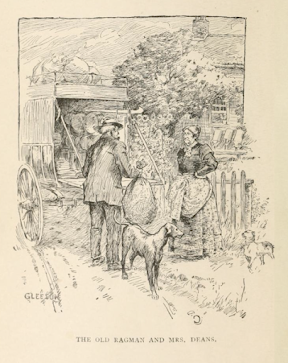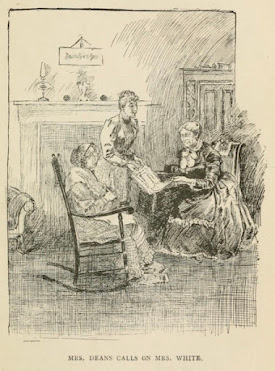Over the boughs that the wind has shaken,Over the sands that are rippled with rain,Over the banks where the buds awakenCold cloud shadows are spreading again.All the musical world is still,When sharp and sudden, a sparrow calls,And down on the grass where the violets shiver,Through the spruce on the height of the hill,Down on the breadths of the shining riverThe faint snow falls.Last weak word of a lord that passes—Why should the burgeoning woods be mute?Spring is abroad in the spiring grassesLife is awake in the robin's flute.But high in the spruce a wind is wailing,And the birds in silence arise and go.Is it that winter is still too nearFor the heart of the world to cast out fear,When over the sky the rack comes sailingAnd suddenly falls the snow?
01 April 2022
Ten Poems for National Poetry Month, Number 1: 'Snow in April' by Marjorie Pickthall
21 March 2022
Joan Suter, Angus Hall, and the Collector in Me
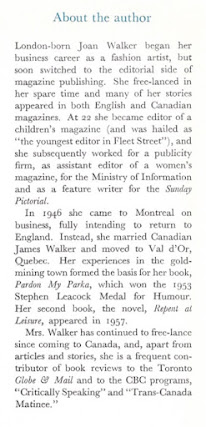 |
| Marriage of Harlequin Joan Walker Toronto: McClelland & Stewart, 1962 |
And then there's this, which may frighten some readers:
14 March 2022
The Dustiest Bookcase: V is for van Vogt
A.E. van Vogt
New York: Signet, 1958
160 pages
The Dustiest Bookcase series is meant to highlight books I've had forever, and have always meant to read and review, but haven't. Destination: Universe is a cheat. It was given to me just last year by someone who knew I liked vintage paperbacks. The pages are loose, the cover is more than scuffed, and still I'm happy to have it, despite my previous encounters with the author.
In the fourteen-year history of the Dusty Bookcase, I've given van Vogt two kicks at the can. I was first dawn into his orbit in by the 1952 Harlequin cover of The House That Stood Still.
(In all seriousness, WTF, Harlequin?)
I disliked The House That Stood Still so much that I included it in my book The Dusty Bookcase. Then gave van Vogt a second chance with Masters of Time, about which I remember nothing. This old review suggests I was unimpressed.
Not really.
02 March 2022
Lunar Attractions; or, The Leacock I Like
Stephen Leacock
Toronto: Gundy, 1915
282 pages
 |
| Montreal: Pocket Books, 1946 First published by Dodd, Mead in 1930 |
“Isn’t it rather late to go there?” I protested.“My dear fellow,” said Mr. Butt warmly, “I don’t mind that a bit. The way I look at it is, here are these two young people, only married a few weeks, just moving into their new house, everything probably upside down, no one there but themselves, no one to cheer them up,”—he was wriggling into his raincoat as he spoke and working himself into a frenzy of benevolence,—“good gracious, I only learned at dinner time that they had come to town, or I’d have been out there days ago,—days ago-”
"Hullo," I called out; "it’s Butt." "I’m awfully sorry," he said, "we’ve gone to bed." "My dear boy," I called back, "don’t apologize at all. Throw me down the key and I’ll wait while you dress. I don’t mind a bit.""Just think of it," continued Mr. Butt, “those two poor souls going to bed at half past ten, through sheer dullness! By George, I was glad I’d come." ‘Now then,’ I said to myself, ‘let’s cheer them up a little, let’s make things a little brighter here.’"
“'He’s ill—some sort of fever—poor chap— been ill three days, and they never told me or sent for me—just like their grit—meant to fight it out alone. I’m going out there at once.” From day to day I had reports from Mr. Butt of the progress of Jones’s illness. “I sit with him every day,” he said. “Poor chap,—he was very bad yesterday for a while, —mind wandered—quite delirious—I could hear him from the next room—seemed to think some one was hunting him—‘Is that damn old fool gone,’ I heard him say. “I went in and soothed him. ‘There is no one here, my dear boy,’ I said, ‘no one, only Butt.’ He turned over and groaned.
“I do,” he answered. “It may be that it is something in my temperament, I suppose one would call it a sort of spiritual mindedness. But I think of it all constantly. Often as I stand here beside the window and see these cars go by”— he indicated a passing street car —“I cannot but realise that the time will come when I am no longer a managing director and wonder whether they will keep on trying to hold the dividend down by improving the rolling stock or will declare profits to inflate the securities. These mysteries beyond the grave fascinate me, sir. Death is a mysterious thing.”
 |
| New York: Dodd, Mead, 1956 |
This novel represents the last word in up-to-date fiction. It is well known that the modern novel has got far beyond the point of mere story-telling. The childish attempt to interest the reader has long since been abandoned by all the best writers. They refuse to do it. The modern novel must convey a message, or else it must paint a picture, or remove a veil, or open a new chapter in human psychology. Otherwise it is no good. SPOOF does all of these things. The reader rises from its perusal perplexed, troubled, and yet so filled with information that rising itself is a difficulty.
“They said they’d sell us tickets. But they questioned us mighty closely; asked where we wanted to go to, what class we meant to travel by, how much luggage we had to register and so on.”
"Stuck it out as best we could: stayed right there in the hotel. Poor Jones was pretty well collapsed! Couldn't do anything but sleep, and eat, and sit in the piazza of the hotel."
Object: A nicely-proportioned hardcover, very typical of its time. My first Canadian edition was purchased three decades ago at the annual McGill Book Fair (held in Redpath Hall, mere metres away from the university's Leacock Building). Price: $1.00. At the end of the volume is found three pages of advertisements for the author's other books: Arcadian Adventures with the Idle Rich, Behind the Beyond, Nonsense Novels, Literary Lapses, and Sunshine Sketches of a Little Town. These are followed by an advert for The International Studio magazine.
Sadly, but unsurprisingly – it was published in 1915, after all – my copy lacks its dust jacket (above).
Should I have expected more for a dollar?
It once belonged to a G.R. England. Going through the 949 Englands in the 1921 census, I find Gordon England (age 19), Gaspard England (age 21), George England (age 51). Gosselin England (age 71)... and that's just Quebec.
Access: Moonbeams from the Larger Lunacy enjoyed several Canadian, British, and American editions before going out of print in the 'twenties. It returned in 1964 as #46 in the New Canadian Library, and remained in print well into the 'eighties. I once purchased a copy with the third series design at Eaton's in downtown Montreal, not 100 meters from the university at which Leacock taught.
Used copies of are both plentiful and inexpensive. If you've got the cash, the one to buy is offered at US$150 by a Milton, Ontario bookseller. It has the dust jacket.
01 March 2022
'March Day: Windy' by Charles Bruce
Verse for the new month by Charles Bruce, the pride of Port Shoreham, Nova Scotia. 'March Day: Windy' is one of twenty-four poems collected in The Mulgrave Road (Toronto: Macmillan, 1951), winner of the 1951 Governor General's Award for Poetry.
This day you wonder, finding nowhere quiteWhat you expect to find. The strident airSurrounds you like a sea of sweeping light;The hills and fields return you stare for stare
Humpbacked and grim, the giant juniperBows down to scowl; across the crawling grassBeyond, where the twin Balm o' Gileads were,Two strangers halt and stiffen as you pass.
Something is altered here. The differenceBetween you and the blowing world is thinned.You turn to face the house, and common sense,And see a woman shouldering the wind.
Turn to the barn, and see an old man leaning,Intent to hear those droning syllables—Those phrases harsh and high, and wild with meaning.Of shouted sound from granite-throated hills.
21 February 2022
A Woman Who Did
The Untempered Wind
Joanna E. Wood
Ottawa: Tecumseh, 1994
354 pages
In Henry James Morgan's Types of Canadian Women, published in 1903 by William Briggs, Joanna E. Wood is described as a "well known Canadian novelist."
She is not today.
She was not a half-century ago.
She was not a century ago.
"Meteor-like" is the word Barbara Goddard uses to describe Wood's career. In fact, it ended the very year Types of Canadian Women appeared.
The novelist was all of thirty-five.
Joanna E Wood was twenty-six when The Untempered Wind, her first novel, was published. Its heroine, Myron Holder, has had a child out of wedlock; she is "a mother, but not a wife," and so suffers the scorn of Jamestown, the small Ontario village in which she was born and raised. Myron's own mother is dead, as is her father. Her unloving grandmother is very much alive and shares a modest house with Myron and her baby boy.
When first published in 1894, The Untempered Wind proved a critical and commercial success, encouraging three printings, each featuring the same ten illustrations. The frontispiece was used on the cover of the Tecumseh edition:
Had I been involved in its publication, I would have chosen one of the illustrations depicting Myron. This is my favourite:
Still, I understand the selection. Myron may be the protagonist of The Untempered Wind, but more pages are given over to those so quick to pass judgement. Mrs Deans, the most prominent, leverages her employ of Myron as an act of sacrifice and charity: "I feel a duty to have her here, but it goes ag'in me, Mr. Long [the ragman] it does that; but there, we all have our cross and we must help along as well as we can." Other women of the village visit Myron's grandmother on the pretence of providing sympathy. Each hopes to be the one who uncovers the identity of the child's father, but not even old Mrs Holder knows his name.
There was something hideously repulsive in this boy's secret cruelties, horrible to relate, sickening to contemplate. But the creatures he tormented, maimed, killed, knew neither anticipation nor remembrance; the "corporeal pang" was all.
The Jamestown people, in making a pariah of Myron Holder, were not urged to the step by imperative feeling of hurt honor or pained surprise. Such faults as hers were not uncommon there; but never before had the odium rested upon one only. Besides, there had always been some "goings on" and some "talk" indicative of the affair. In Myron Holder's case, the Jamestown people had been caught napping. In such eases a marriage and reinstatement into public favor was the usual sequel, arrived at after much exhilarating and spicy gossip, much enjoyable speculation, much meditation upon the part of the matrons, and much congratulation that all had ended so well.
The Untempered Wind was first published the year before The Woman Who Did by fellow Upper Canadian Grant Allen. The latter, also a story of an unwed mother, was a succès de scandale. Wood's novel didn't raise as much stink, but it was a success. The three printings by original publisher New York's J Slewing Tait and Sons were followed in 1898 by an Ontario Publishing Company edition.
Together The Untempered Wind and The Woman Who Did stand as two of the most remarkable Canadian novels of the nineteenth century.
Neither was so much as mentioned in my CanLit classes.
Object and Access: A trade paperback with introduction by Klay Dyer, The Untempered Wind is the seventh volume in Tecumseh's essential Early Canadian Women Writers Series. I purchased my less than pristine copy eight years ago at London's Attic Books. Price: $2.23. It's available from the publisher at $17.95 (plus postage) through this link.
 |
| Current Literature, November 1894 |
The Tait and Sons first edition can be read online here, but this scan of the third printing – reproduced in the Tecumseh edition – is much easier on the eyes.
16 February 2022
On Pierre Poilievre's Bookshelves
What with everything going on in Ottawa these days, my focus on things political has shifted from Parliament Hill to the hot tubs and bouncy castles on Wellington Street, and so it wasn't until yesterday that I found time to watch Pierre Poilievre's three-minute YouTube announcement of his run for
The only volume I recognise on the top centre shelf is Rupert Murdoch's HarperCollins Study Bible (sadly, lacking dust jacket).
The next shelf holds five Dickens novels belonging to the Penguin Clothbound Classics series: Bleak House, Hard Times, Oliver Twist, A Tale of Two Cities, and Great Expectations. PenguinRandomHouse sells these volumes as part of a six-volume set. I wonder what it means that A Christmas Carol is missing.
All in all, it's a curious collection, arranged in a manner that can make sense only to Poilievre himself. Everything seems so neat, so orderly, so tidy, but look carefully and you'll find evidence of a more chaotic fourth row of shelves, all but blocked by his well-polished desktop. As with career politicians, some lean left, but most lean right.


